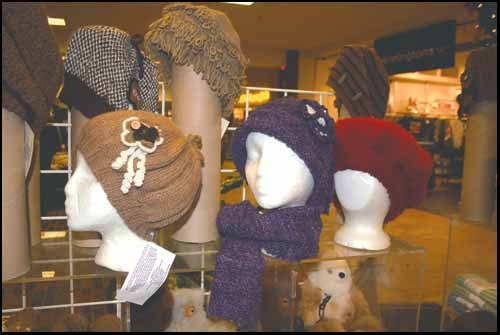Alpacas have become more than farm animals for Bob and Polly Schindel.
The Lintlaw-area couple now not only raise the animals native to South America, but have the animal's fibre coat processed, made into a variety of garments and other items, which they market direct to consumers.
It's a long way from the humble start in the business when the Schindel's purchased five animals in 1996.
"They came direct from Chile," said Polly Schindel who was at the Yorkton Farmers' Market Saturday at the Parkland Mall in the city. "They were quarantined in Australia for a few months."
The decision to try alpacas was made based on a slow agricultural economy at the time.
"Farming sucked," said Schindel flatly. "We were looking for something to diversify."
Polly Schindel said her husband was "looking in the Auto Trader and saw an ad for alpacas."
They were interested, and made a trip to Alberta for a closer look at the animals, took a few courses on working with the animals, and made the purchase.
Schindel said the animals are rather low maintenance.
"They're very easy keeping," she said, adding at the time she had young daughters at home and having a smaller animal to work with was a plus. " They just need some hay, grass, and to be sheered once a year."
The herd, operated under the farm name Saskapaca, is much larger today.
"We run over 100 alpacas," said Schindel, who admitted that makes their herd among the largest in the province, with most running under 25. As secretary of the Saskatchewan Alpaca Breeders Network, she said the group has 40 members, but she knows more people than that raise alpacas in the province.
The herd grew as the Schindels focused on the animal's fine fibre.
"We kind of got into the fibre more than the breeding stock," she said, adding the herd has all been built up from the original five animals.
Depending on the age of an animal, and the quality of fleece, an alpaca will sheer two-to-10 pounds of fibre.
"I send it away to spin into yarn," said Schindel, adding there used to be a mill in Saskatchewan but it has down-sized. "So we have been sending to a mill in Ontario."
Through the provincial network Schindel said they have a project under way with Canadian Agricultural Adaptation funding which could lead to a mill in Saskatchewan.
"It's a study through the University of Saskatchewan," she said, adding scientists are studying how to make the milling process more efficient, and as a result more profitable.
"That's very promising," she said. "We're about eight-months into that. That's exciting."
Initially they worked with natural fibre colours, but last year had the mill dye some fibres.
"They've been really popular," said Schindel.
Once the yarn is returned, Schindel takes it one more step. She pointed to tubs of yarn for sale and said "it's also bait." She explained when someone looks at the yarn, she will ask them if they do custom knitting.
The process has helped Schindel create a network of knitters from Jasper to Brandon, The Pas and most East Central Saskatchewan communities including Yorkton.
In some case the custom knitters do what Schindel needs, and some specialize in what they like to do.
"One lady here in Yorkton just does mitts," said Schindel, adding another local knitter aged 88, "does just about anything I ask her to do."
Using a network of knitters means Schindel is able to offer some truly unique items.
A lady in Theodore made a sweater on sale in Yorkton. "She designed the pattern herself, so it's unique," said Schindel.
And Schindel has just recently found "a weaver in Brandon who is doing beautiful scarves."
Schindel said the knitters may not be paid what their time should be worth, but she delivers the yarn, and it provides them with some extra cash as they do something "they love to do."
Schindel then does the marketing of the items, mostly through craft shows from Jasper to The Pas, being on the road from October to near Christmas.
It's a lot of weekends away from home, and a lot of miles, but Schindel said, "that's the fun part. I get to meet so many different people and educate about alpacas, and how great their fibre is
"It's really rewarding having people appreciate the work you do to get product done."
While trade shows will remain important to marketing, Schindel said she will open a small storefront in Kelvington later this month.
"We're hoping to get some traffic going to Greenwater (Provincial Park), some tourist trade," she said.
Schindel is also looking to diversify what her alpacas bring in in terms of returns.
"We're starting to try the meat now too. It's really nice lean meat," she said, adding an animal cuts out at about 85-pounds of meat.
Since the animals are raised without antibiotics, and because it's so lean, Schindel said, "I think people will be willing to try it, maybe not a roast, but maybe the jerky or pepperoni."
You can find Saskapaca on the Internet at www.saskapaca.com




